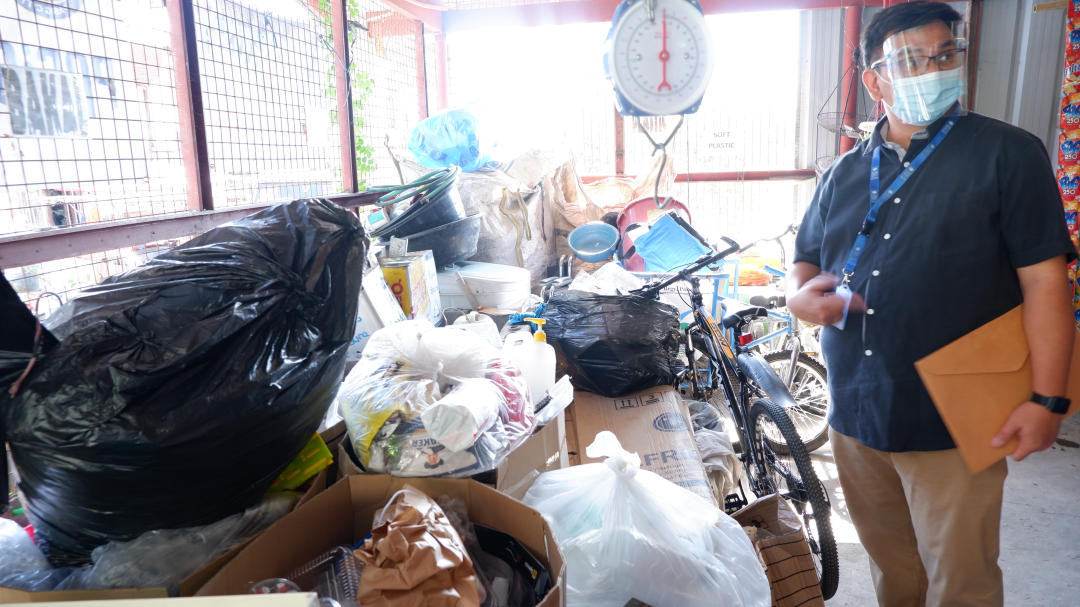Disclaimer:
Please be aware that the content herein has not been peer reviewed. It consists of personal reflections, insights, and learnings of the contributor(s). It may not be exhaustive, nor does it aim to be authoritative knowledge.
Title
Please provide a name for your action learning plan.
Expanding Innovation for Circular Economy: ALab PH's journey as UNDP PH scales its CE portfolio footprint from one city to as many as 60 localities.
Challenge statement
Challenge type: If you are working on multiple challenges, please indicate if this is your "big bet" or "exploratory" challenge.
Please note: we ask you to only submit a maximum of 3 challenges - 1x Big Bet, 2x Exploratory. Each challenge must be submitted individually.
EXPLORATORY
Challenge statement: What is your challenge? (Please answer in specific terms: "Our challenge is that...”.)
As UNDP Philippines' portfolio on Circular Economy (CE) has grown from an exploratory and experimental intervention in one city to a full-blown programme covering as much as 60 localities, ALab PH is faced with the challenge of (re)defining its role and mandate in the portfolio.
Note that this frontier challenge is technically a big bet of the UNDP PH Country Office, but the exploratory element is on the role of ALab PH itself (also, ALab PH technically already has one big bet in 2024: Inclusive Value Chains - Malay Food System).
Background: What is the history of your challenge? What is causing or driving it? Who is involved? How does the current situation look like? What undesired effects does it produce?
Marine plastic litter is one of the most pressing development threats faced by the Philippines: not only in terms of harms to the coastal and marine environment, but also to resilience to climate change. The leakage of plastic waste in waterways is not merely a waste management problem but a systemic issue that requires a holistic lense to solve. Since 2019, the UNDP Accelerator Lab in the Philippines (ALab PH) has been helping to steer the country office towards building a portfolio for circular economy (CE) to support the country’s response to the climate crisis and transition to more inclusive and resilient economies.
It began with an initiative to test the use of systemic design to help the Pasig City local government and its stakeholders to co-design a portfolio of options for Circular Economy. The nascent success of this initiative has drawn interest from government partners and international donors, which has allowed UNDP Philippines to scale its own CE portfolio from one city, to five under a Japan Supplemental Budget-funded project on Accelerating CE in Cities for [REDACTED_PHONE] (ACE Project) with $2.9 million. Beginning 2024, this portfolio is slated to grow massively to cover as much as 60 localities under the EU-funded Green Economy Programme for the Philippines (EU-GEPP). In this consortium-implemented programme (with GIZ, Expertise France, and IFC), UNDP leads the component on localizing CE with funding of about $24 million (of a total $60 million for the whole programme).
As UNDP's CE portfolio has scaled up and wide as projects under the Climate Action Programme, ALab PH has been figuring out its role in supporting its implementation. While it is clear that ALab PH is uniquely positioned to provide social innovation services, it is faced with multi-layered challenges in delivering its value to the programme. The additional challenge for the ALab team is the untimely passing of Rex Lor, Head of Solutions Mapping, who has led the CE portfolio for the Lab since 2019. This shock has left a huge gap in ALab's engagement in the CE space, forcing the team to rethink and reflect on its role and value offer.
Quantitative evidence: What (official) data sources do you have on this challenge that better exemplifies the importance and urgency of this frontier challenge? You can add text, a link, or a picture.
The country is among the top contributors of plastic wastes: in 2019, about 356,371 tonnes or 36% of the global total (see https://ourworldindata.org/plastic-pollution).
Qualitative evidence: What weak signals have you recently spotted that characterizes its urgency? Please provide qualitative information that better exemplifies the importance and urgency of this frontier challenge. You can add text, a link, or a picture.
Value proposition: What added value or unique value proposition is your Accelerator Lab bringing to solving this challenge? Why is it your Lab that needs to work on this challenge and not other actors within UNDP, other stakeholders in the country respectively? Why is it worth investing resources to this challenge?
While it is clear that ALab PH is uniquely positioned to provide social innovation services, it is faced with multi-layered challenges in delivering its value to the programme. First, how it can scale the application of its tools and services from handholding one city to applying the same in multiple cities at the same time. Second, how it can protect its space and mandate for exploration and experimentation while being drawn into programme and project management (at times necessarily, if only to get things done). Third, how it can finally demonstrate and quantify results and impact, given that the Pasig city work is even still midway in implementation.
In the face of these challenges, ALab PH is aiming to provide continued social innovation support to ensure the continuity and scaling of innovation initiatives that have been initiated under the Pasig initiative and the ACE Project into the EU-GEPP Project: these include the a) application of systemic design to faciliate portfolio development at city level; b) the Innovation for Circular Economy (ICE) Hub being operationalized in Pasig City and at least one more city; (c) scaling of data innovations mainly through the Pintig Data Lab (ALab PH's sister lab that it had incubated); (d) intensification of behavioral insights and change; (e) integration of grassroots innovation in circular economy. Meanwhile, ALab Ph is called to bring in stronger impact delivery and measurement to CE initiatives, advising and collaborating with the Climate Action Programme in demonstrating the results and value of circularity.
Short “tweet” summary: We would like to tweet what you are working on, can you summarize your challenge in a maximum of 280 characters?
@UNDPPH's Circular Economy portfolio continues to grow, beginning from one city in 2019 to cover up to 60 more localities by 2028. Innovation--from nurturing local entrepreneurs, to leveraging data-driven behavioral nudging--is at the heart of this portfolio.
Partners
Who are your top 5 partners for this challenge? Please submit from MOST to LEAST important and state Name, Sector and a brief description of the (intended) collaboration.
Please state the name of the partner:
Local government units: from Pasig City to up to 60!
What sector does our partner belong to?
Government (&related)
Please provide a brief description of the collaboration.
UNDP PH's CE portfolio footprint has expanded from Pasig City (where the systemic design approach was first tested) to five cities under the ACE Project (adding Quezon City, Caloocan, Manila, and Cotabato City). This will further expand to up to 60 cities (20 for deep action and 40 for light touch), with the first 10 cities having been identified (includes Pasig City, Quezon City, and Caloocan).
Is this a new and unusual partner for UNDP?
Yes
Who are your top 5 partners for this challenge? Please submit from MOST to LEAST important and state Name, Sector and a brief description of the (intended) collaboration.
Please state the name of the partner:
UNDP Teams: PH Climate Action Programme Team; BRH Innovation and NCE Teams
What sector does our partner belong to?
United Nations
Please provide a brief description of the collaboration.
The Circular Economy portfolio sits under the Climate Action Program Team (CAPT), who leads key programmatic actions from programme and project design to procurement and financial management. ALab PH supports CAPT by providing social innovation services, although in the past it has been called to fill in gaps in programme implementation (e.g., to lead actions while project teams are still being set up). The UNDP Bangkok Regional Hub (BRH), particularly the Innovation and Nature, Climate and Energy (NCE) provides much needed support to the PH CE portfolio through technical assistance, catalytic financing, and other strategic support.
Learning questions
Learning question: What is your learning question for this challenge? What do you need to know or understand to work on your challenge statement?
How should ALab PH (re)define its role in an innovation portfolio that has grown into a full-scale programme? How could it balance the need to ensure completion and sustainability of innovations it has introduced while contributing to honest-to-goodness impact measurement of CE interventions?
To what stage(s) in the learning cycle does your learning question relate?
Grow
Usage of methods: Relating to your choice above, how will you use your methods & tools for this learning question? What value do these add in answering your learning question?
The core method being used by ALab PH in the CE portfolio is Systemic Design: a combination of systems thinking and human-centered design to discover and prototype solutions that are responsive to a holistic understanding of complex problem spaces. Within Systemic Design, ALab PH uses rapid ethnography (to surface the lived experience of system actors), co-creation (to enable stakeholders to build a portfolio of options), and prototyping (to put flesh and bone to ideas for solutions). Moreover, ALab PH has used sensemaking to help bring coherence across the portfolio team (needed at several steps of the process) and ensure synergy across the various moving parts. It is also sensemaking which ALab PH will need to use in order to define its role in the CE portfolio moving forward.
Existing data gaps: Relating to your choice above, what existing gaps in data or information do these new sources of data addressing? What value do these add in answering your learning question?
I was hoping that team reflections and retrospectives are included in the data sources, but for now "focus group" should be fine. There are many more alternative data sources being used in the portfolio itself (e.g., remote sensing of marine litter using satellite imagery) but the specific learning question actually calls for a lot of introspection and consultation with stakeholders to gather feedback. Autoethnography may also likewise be useful in the process of introspection.
Closing
Early leads to grow: Think about the possible grow phase for this challenge - who might benefit from your work on this challenge or who might be the champions in your country that you should inform or collaborate with early on to help you grow this challenge?
The Circular Economy portfolio is definitely in its grow phase, and the challenge faced by ALab PH is how it defines and performs its role in such phase. As such, it continues to work closely with the Climate Action Programme Team as well as broader CE portfolio team in defining such role.
END OF ACTION LEARNING PLAN: Thank you! The form saves automatically and your submission has been recorded. You may now exit this window.


 11Sustainable cities and communities
11Sustainable cities and communities 12Responsible consumption and production
12Responsible consumption and production
 13Climate action
13Climate action
Comments
Log in to add a comment or reply.